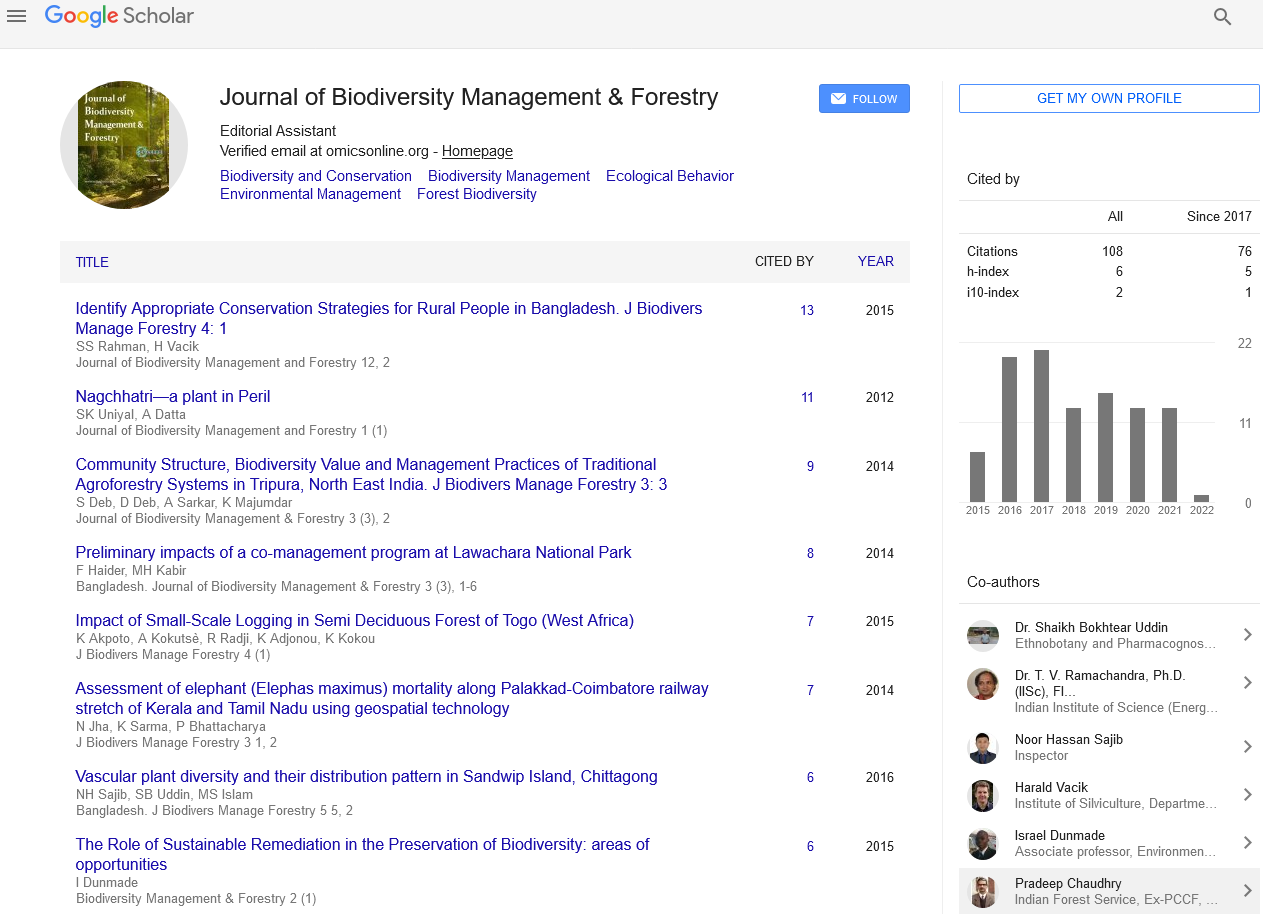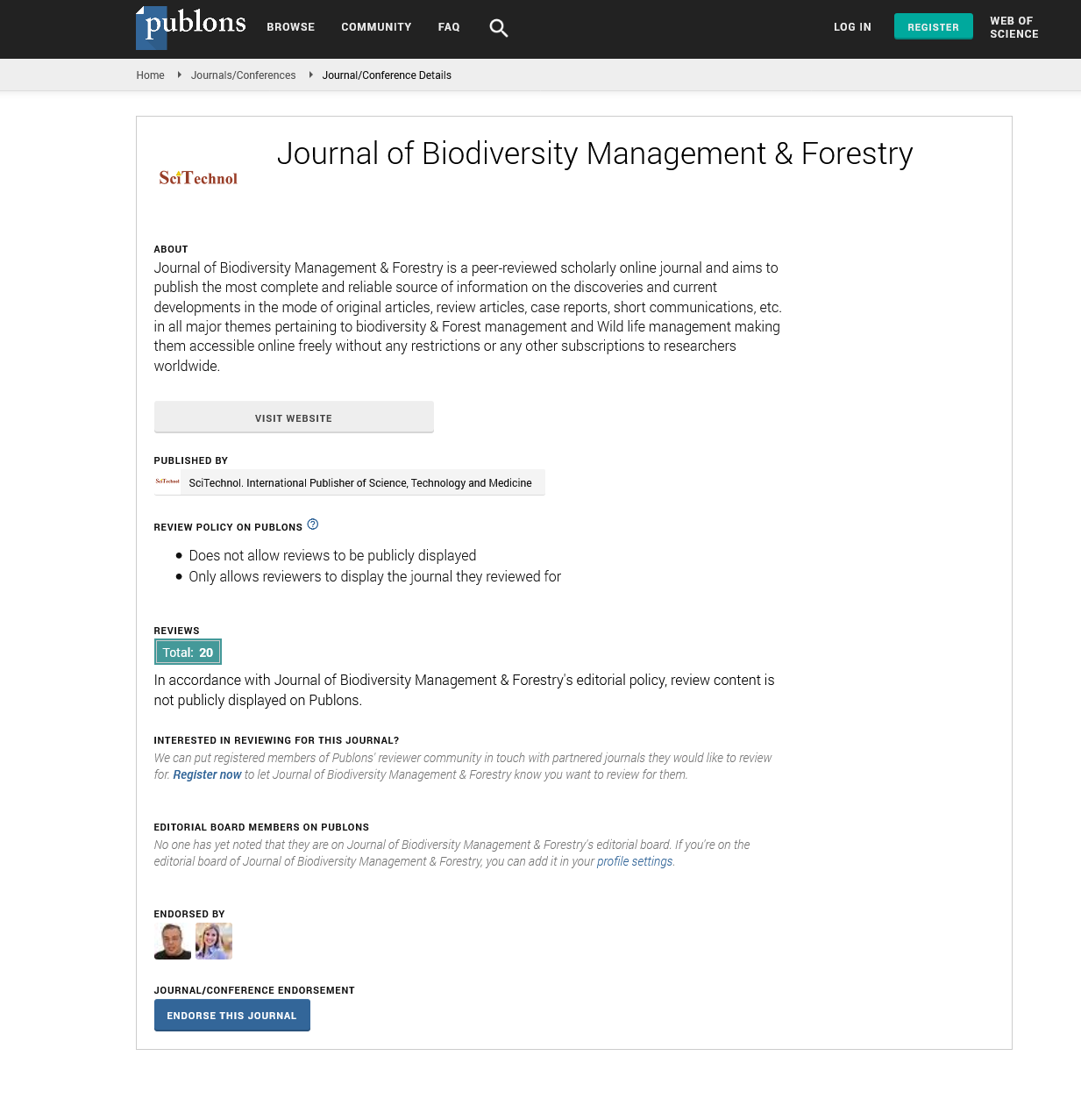Perspective, J Biodivers Manage Forestry Vol: 12 Issue: 2
Community-Based Approaches to Forest Conservation and Biodiversity Management
Froyd Krog*
1Department of Energy and Process Engineering, Norwegian University of Science and Technology, Trondheim, Norway
*Corresponding Author: Froyd Krog
Department of Energy and Process
Engineering, Norwegian University of Science and Technology, Trondheim, Norway
E-mail: krog.froyd@edu.no
Received date: 27 March, 2023, Manuscript No. JBMF-23-98643;
Editor assigned date: 30 March, 2023, Pre QC No. JBMF-23-98643(PQ);
Reviewed date: 14 April, 2023, QC No. JBMF-23-98643;
Revised date: 22 April, 2023, Manuscript No. JBMF-23-98643 (R);
Published date: 28 April, 2023, DOI: 10.4172/jbmf 2327-4417.10037
Citation: Krog F (2023) Community-Based Approaches to Forest Conservation and Biodiversity Management. J Biodivers Manage Forestry 12:2.
Description
Forest conservation and biodiversity management are important for maintaining the ecological integrity of the planet. In recent years, community-based approaches have gained recognition as effective strategies for achieving these goals. Community-based approaches involve local communities as key stakeholders in the conservation and sustainable management of forests and their biodiversity. This will discuss the principles, benefits, and challenges of community-based approaches to forest conservation and biodiversity management, highlighting the importance of empowering communities, promoting traditional knowledge, fostering partnerships, and considering socioeconomic factors.
Central to community-based approaches is the empowerment of local communities to actively participate in decision-making processes and take ownership of forest conservation and biodiversity management initiatives. This empowerment involves recognizing and respecting local rights, traditional knowledge, and cultural practices. By involving communities in the planning and implementation of conservation strategies, their sense of ownership and responsibility for the forests and their biodiversity is strengthened. This engagement fosters a deeper understanding and appreciation of the ecological importance of forests, leading to long-term sustainable practices.
Local communities often possess a wealth of traditional knowledge and practices that have been developed over generations. This knowledge encompasses sustainable resource management techniques, traditional ecological wisdom, and effective conservation practices. Community-based approaches recognize the value of this knowledge and seek to integrate it with scientific knowledge to enhance forest conservation and biodiversity management efforts. By combining traditional practices with modern scientific approaches, communitybased initiatives can benefit from the synergy of local and external knowledge systems, resulting in more holistic and context-specific conservation strategies.
Collaboration and partnerships among various stakeholders are important for successful community-based approaches to forest conservation and biodiversity management. These partnerships can involve local communities, Non-Governmental Organizations (NGOs), government agencies, researchers, and other relevant actors. By working together, stakeholders can pool resources, share expertise, and collectively address conservation challenges. Partnerships also facilitate capacity building, allowing communities to acquire the necessary skills and knowledge to actively participate in conservation activities. Such collaborations provide a sense of shared responsibility and promote a collective vision for sustainable forest management.
Community-based approaches recognize the interdependence between biodiversity conservation, sustainable development, and the socio-economic well-being of local communities. These approaches consider the socio-economic factors that influence forest use and management practices. By addressing the needs and aspirations of communities, such as livelihood opportunities, access to education, and healthcare, conservation efforts can gain local support and ensure the long-term sustainability of initiatives. Community-based approaches often incorporate alternative income generation activities, such as sustainable ecotourism or non-timber forest product enterprises, which can provide economic incentives for communities to engage in conservation practices while improving their quality of life.
Community-based approaches offer numerous benefits, including enhanced conservation outcomes, increased social equity, and strengthened resilience of forest ecosystems. By involving local communities, these approaches can lead to better compliance with conservation regulations, reduced illegal activities, and improved monitoring and enforcement. They also foster a sense of pride, cultural identity, and social cohesion within communities.
However, community-based approaches also face challenges. These include ensuring equitable benefit-sharing, addressing power imbalances, and managing conflicts of interest among different stakeholders. Additionally, building capacity within communities, addressing external pressures (such as industrial activities), and securing long-term financial support can pose significant challenges.
Community-based approaches to forest conservation and biodiversity management provide a promising pathway for achieving sustainable outcomes. By empowering communities, promoting traditional knowledge, fostering partnerships, and considering socioeconomic factors, these approaches provide a sense of ownership, generate positive ecological impacts, and improve the well-being of local communities.
 Spanish
Spanish  Chinese
Chinese  Russian
Russian  German
German  French
French  Japanese
Japanese  Portuguese
Portuguese  Hindi
Hindi 
